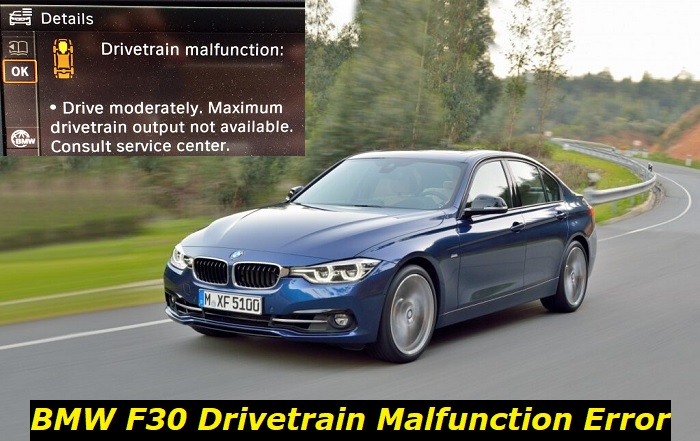BMW F30 generation is a line of cars made by BMW. This generation enjoyed great success between 2011 and 2019 when they were produced. The F30 boasts a sporty chassis and affords you plenty of areas you can upgrade. Though popular because of its sporty and comfy appeal, the F30 seems to be haunted by several issues, among them the drivetrain malfunction.
This article will delve into the drivetrain malfunction issue in the F30 generation of BMW sedans. Being a BMW, the turbocharged F30 offers you an exceptionally sporty drive. The technology in the F30 is well ahead of your ordinary sedan. This is because whenever the car encounters a drivetrain issue, it notifies you via the infotainment screen.
Drivetrain malfunction is not common, but when it happens, a message will appear on the car screen saying what you should do, for example, "Continue the journey at a moderate speed" or "Drive moderately", or "You may continue driving", or "Stop immediately" depending on the issue that triggered the "Drivetrain malfunction" error message.

Understanding the drivetrain malfunction error message on BMW F30
Drivetrain malfunction in your BMW F30 will happen because a drivetrain component is affected. Drivetrain components are:
- Transmission
- Driveshaft
- Constant velocity joint (CV joint)
- Universal joint (U- Joint)
- Differential, which houses the axles.
The BMW F30 car is designed so that whenever the drivetrain malfunction happens, the vehicle switches to safety mode. The car's Engine Control Unit (ECU) reduces the total torque required for optimal performance. This reduced performance ensures the engine and the transmission don't get damaged.
Other than the drivetrain malfunction error on your dashboard, you are also likely to experience other symptoms, such as;
- The check engine light (CEL) turns ON
- The transmission stuck in one gear (usually the Limp Mode)
- Engine misfiring
- Noticeable vibration or shaking of the car
- The car may fail to start
- Rough idling or power cut off while idling
- More than usual smoke from the exhaust
What are the causes of drivetrain malfunction error?
1. Old spark plugs
In many instances, the symptoms displayed by your car should guide you to the root cause of the problem. When the drivetrain malfunctioning message appears and the car misfires, you should immediately check the spark plugs.
A spark plug comes with a curved point that produces sparks. As the spark plug gets old because of use, the high voltage spark jumping to the curved end becomes unstable and inconsistent. This means combustion in the engine is inefficient hence misfiring and rough idling.
2. Ignition coil failure
The ignition coil is a component responsible for supplying the spark plugs with power. The ignition coil is critical as it determines the engine's combustion timing. If the coils go bad, less power is sent to the spark plugs, resulting in ineffective spark plugs.
Faulty ignition coils cause rough idling, power loss, misfiring, and damage to the engine if left unattended. The fuel economy will also be negatively affected. The coils' performance deteriorates due to engine vibrations and extreme heat. To avoid damage to the coils and ensure optimal performance, do a replacement after every 25,000 miles.
3. Fuel pump failure
Your BMW F30 likely has a Bosch fuel pump which has proved to be very effective and reliable. The pump transfers fuel from the fuel tank to the fuel lines under intense pressure. This enables the engine to work optimally because fuel should be highly pressurized.
A faulty fuel pump will become apparent when you accelerate your BMW. In most cases, the drivetrain malfunction error will pop up when you accelerate. You should also notice considerable loss or surge of power when you accelerate.
4. A faulty catalytic converter
This problem mainly affects the older BMWs. But given that your F30 could never be older than 2011, you will not likely experience a drivetrain malfunction error unless you are a very high mileage driver. Still, it is worth highlighting it because this exhaust part could cause your drivetrain problems.
The catalytic converter is the device responsible for cleaning the car's exhaust emissions. It is found alongside the exhaust system below the vehicle. This converter uses a chemical reaction to convert dangerous gases such as NO2 and CO to less harmful CO2 and water vapor.
Over time, the exhaust gas debris gets trapped by the catalytic converter. This slows down and, at times, even stops the converter from working. The clogging in the catalytic converter creates pressure in the exhaust system. This will then clog the exhaust chamber, which in turn creates pressure in the engine, which can cause it to stall.
5. Transmission fluid leak
Transmission fluid leaks can also cause drivetrain malfunction in your BMW F30. Transmission fluid lubricates the vehicle's transmission system as well as cools it. If there is a leakage of transmission fluid, the drivetrain malfunction error will appear. You might also hear strange noises coming from the engine area. You will also hear as though the gears are grinding.
6. Faulty fuel injector
Diesel cars use injectors, while petrol cars use spark plugs. A faulty fuel injector will have almost all of the symptoms mentioned above. The fuel economy will deteriorate, and you'll experience rough idling, engine misfire, and vibrations. While checking the fuel injector, consider analyzing whether the car's fuel is substandard.
In many cases, a fuel injector is damaged by fuel contaminants. It is, therefore, important to only fuel your especially sensitive F30 at an approved petrol or gas station. Continuously driving your car with very little fuel can also create problems for your injector.
7. A faulty turbo
The BMW F30 comes equipped with a turbocharger. When the turbo is faulty, the drivetrain will not work optimally. A symptom of a defective turbo is a sudden loss of power. Many F30 owners have found the fault to be with the diverter valve, which, when replaced the turbo works perfectly.
Fixing the BMW F30 drivetrain malfunction
Solving the drivetrain malfunction problem involves several steps, which are;
- Switching the engine OFF - If the error suddenly pops up while driving, you should first switch off the engine and remove the key. Of course, you should be a safe driver and aware of your surroundings. Look for a safe place to stop.
- Let the car sit for about 10 minutes. This allows the vehicle to temporarily reset the drivetrain, after which the car will continue driving normally. But make sure you pass by your BMW mechanic to have the car checked. If the car has already switched to 'limp mode, continue driving moderately home to the garage.
- Check the engine - If the car did not resolve the problem when you switched off the engine, it is time you took a peep under the hood. Visually check for any leakages or damaged parts that might have caused the malfunction.
- Use a diagnostic tool to locate the problem. Whether you decide or employ the services of a BMW mechanic, an OBD-II scanner that is compatible with your BMW F30 is the ideal machine to help you find answers. Locate the diagnostic port and plug in the scanner. You should then insert the key in the ignition but don't turn it.
Using the OBD -II scanner, look for drivetrain errors in the DME, EGS, and AGS. DME stands for Digital Motor Electronic and is where engine codes are stored. EGS stands for Electronic Gearbox, while AGS is Adaptive gearbox. These two gearboxes store all the transmission codes. Scanning these areas will give you the answer as to what is causing the drivetrain malfunction error.
The scanner will give you the code of what is wrong with the car. The good thing about using the scanner is that guesswork is thrown out of the window. You will not be all over the drivetrain, which might take weeks to pinpoint where the problem is. If scanning your BMW F30 is not an option for you, take your car to a BMW mechanic who has all the necessary equipment for the job.
Can one prevent drivetrain malfunction problems?
Driving habits affect every part of the car. Sudden acceleration, wrong wheel alignment, and incorrect air pressure will cause your car tires to wear out faster. The same case goes for the drivetrain of your car.
Though the drivetrain malfunction error can affect any BMW F30, it is more likely to happen to those cars regularly put to abrupt or sudden acceleration. Intense inclines and overtaking tend to be the other causes of this problem.
Conclusion
In the article, we have explored the drivetrain malfunction error in the BMW F30. We have looked at what it is and what normally leads to the error message appearing on your dashboard. The suggested solution to the malfunction can be cheap if handled in the proper manner and at the appropriate time.
The drivetrain malfunction error can affect any car. Even though rare, the issue can reoccur in the same car is not handled correctly or if the same component or a different one breaks down. The vital thing to note, however, is that a drivetrain malfunction error should not drive you into a panic. By following the instructions correctly, your car will be good and back on the road within no time.
About the authors
The CarAraC research team is composed of seasoned auto mechanics and automotive industry professionals, including individuals with advanced degrees and certifications in their field. Our team members boast prestigious credentials, reflecting their extensive knowledge and skills. These qualifications include: IMI: Institute of the Motor Industry, ASE-Certified Master Automobile Technicians; Coventry University, Graduate of MA in Automotive Journalism; Politecnico di Torino, Italy, MS Automotive Engineering; Ss. Cyril and Methodius University in Skopje, Mechanical University in Skopje; TOC Automotive College; DHA Suffa University, Department of Mechanical Engineering






Add comment